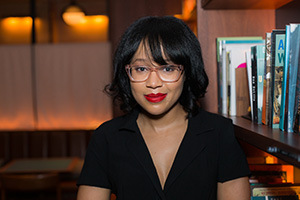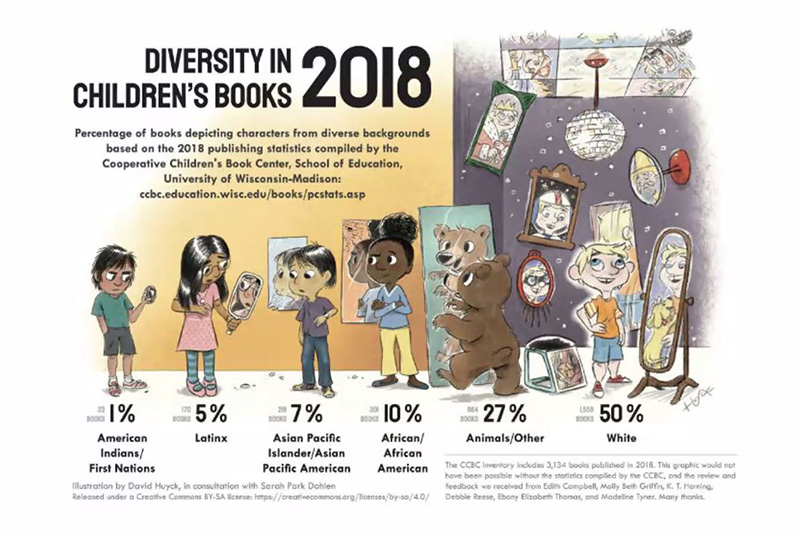- Apply
- Visit
- Request Info
- Give
‘Decolonize your bookshelf’: University Hour speaker challenges readers
Written by Michael Rouleau
Published on March 11, 2021

New York Times best-selling author Dhonielle Clayton gave a University Hour presentation at Eastern Connecticut State University on March 10 about the “radical” power of children’s books and the imperative of providing children with more inclusive literature. Clayton is also the chief operating officer of the non-profit organization We Need Diverse Books, which advocates for changing the publishing industry to produce more storytelling that reflects the lives of all young people.
Clayton insisted that the debate surrounding children’s literature is indeed radical, as she has been on the receiving end of numerous death threats and hate mail over the course of her advocacy. She said that children’s literature has a responsibility to truth-telling and to telling stories from all perspectives.
Clayton referred to the truths of prejudice and systemic racism and how these biases have even been written into stories for children. “The books we give young people help them to navigate these truths,” she said, adding that books have the power to tell people what to think and reinforce the status quo.
Clayton said that books became a place of power and refuge for her early in her life. “I found all kinds of truths,” she said. “Books showed me that friendships are precious and rare; that girls have strength.” Yet, as a Black woman, she still wonders, “How different would I be if as a child there were more stories with ‘me’ in them?”
Clayton shared research by the Cooperative Children’s Book Center at the University of Wisconsin-Madison that revealed the diversity of books published in 2018. Of the 3,134 new books, 1 percent were about Native Americans; 5 percent about Latinx characters; 7 percent about Asian Americans; and 10 percent were about African Americans. That same year, 27 percent of books starred animal/other characters and 50 percent were about White characters.
 As an ancient human tradition, stories have the power to shape the impressions we have of ourselves and others, said Clayton. “What happens when you can’t find yourself in stories, or when the stories you’re in are scary or inauthentic?” In her experience with children’s books, she recalled several tropes and stereotypes: “Black girls are never princesses; Black boys are only athletes; Black girls are never love interests.”
As an ancient human tradition, stories have the power to shape the impressions we have of ourselves and others, said Clayton. “What happens when you can’t find yourself in stories, or when the stories you’re in are scary or inauthentic?” In her experience with children’s books, she recalled several tropes and stereotypes: “Black girls are never princesses; Black boys are only athletes; Black girls are never love interests.”
Clayton said that children’s literature has a responsibility to grow the imaginations of all children. “It’s good to see yourself reimagined… I deserve a swooning love story!... What’s the big deal about ‘Black Panther?’” she said of the 2018 blockbuster superhero movie. “It’s the first time I’ve ever seen a cast of characters who look like me save the world.”
Conversely, she said it’s also damaging when stories about people of color are overwhelmingly in the context of pain — slavery, poverty, discrimination. “These are important stories, but not the only ones.”
Clayton called for readers to decolonize their bookshelves. “Are all of your books with marginalized people about tough positions? Are all of your books about native peoples set in the past? Or is there anything fun and contemporary?”
She also cautioned readers to prioritize own-voice authors as opposed to cross-cultural writing. While it may be a step in the right direction, Clayton said that attempting to write from other people’s perspectives is not that same as other people writing from their own perspective.
Just as the #WeNeedDiverseBooks movement is about exposing children to more inclusive books, it’s also focused on changing the publishing industry to empower writers from diverse backgrounds.
In her call to decolonize bookshelves, Clayton charged readers to challenge the “classics” and to make room for new books and different voices. “I always get the most hate mail when I talk about ‘To Kill a Mocking Bird,’” she said, referring to the beloved 1960 novel by Harper Lee.
She’s been assigned to read this book four times over the course of her schooling — from middle school through higher education. “But I’ve only been assigned Langston Hughes once,” she said, and listed several other classic-worthy one-off reading assignments by non-White authors. “I’m not saying to get rid of the ‘classics.’ Curation is not cancellation.”
Speaking to the crowd of mostly English and education majors, Clayton concluded, “I think stories and books are how we make sense of the world and this weird, messy human experience. As scholars, writers and educators, we’ve been given the most wonderful privilege to work with stories. If the book is one of our greatest instruments, we must tell the truth and be inclusive, otherwise we’re creating one type of narrative.”
###
Dhonielle Clayton is a New York Times bestselling author of “The Belles” series, the co-author of the “Tiny Pretty Things” duology, a Netflix original series, and the author of the forthcoming middle grade fantasy series “The Marvellers.” She taught secondary school for several years and is a former elementary and middle school librarian. She is chief operating officer of the non-profit We Need Diverse Books, and owner of CAKE Literary.


